
AutoMathText
Official implementation of DPFM @ ICLR 2024 paper "Autonomous Data Selection with Language Models for Mathematical Texts" (Huggingface Daily Papers: https://huggingface.co/papers/2402.07625)
Stars: 73

AutoMathText is an extensive dataset of around 200 GB of mathematical texts autonomously selected by the language model Qwen-72B. It aims to facilitate research in mathematics and artificial intelligence, serve as an educational tool for learning complex mathematical concepts, and provide a foundation for developing AI models specialized in processing mathematical content.
README:
Homepage: https://auto-data-selection.github.io.
Official implementation of DPFM @ ICLR 2024 paper "AutoMathText: Autonomous Data Selection with Language Models for Mathematical Texts" (https://arxiv.org/abs/2402.07625).
Featured as Huggingface Daily Papers! (https://huggingface.co/papers/2402.07625)
AutoMathText is an extensive and carefully curated dataset encompassing around 200 GB of mathematical texts. It's a compilation sourced from a diverse range of platforms including various websites, arXiv, and GitHub (OpenWebMath, RedPajama, Algebraic Stack). This rich repository has been autonomously selected (labeled) by the state-of-the-art open-source language model, Qwen-72B. Each piece of content in the dataset is assigned a score lm_q1q2_score within the range of [0, 1], reflecting its relevance, quality, and educational value in the context of mathematical intelligence.
Huggingface dataset: https://huggingface.co/datasets/math-ai/AutoMathText
The primary aim of the AutoMathText dataset is to provide a comprehensive and reliable resource for a wide array of users - from academic researchers and educators to AI practitioners and mathematics enthusiasts. This dataset is particularly geared towards:
- Facilitating advanced research in the intersection of mathematics and artificial intelligence.
- Serving as an educational tool for learning and teaching complex mathematical concepts.
- Providing a foundation for developing and training AI models specialized in processing and understanding mathematical content.
- Meta Prompt for Selecting OpenWebMath:
"""<system>
You are ChatGPT, the most capable large language model equipped with extensive expertise in
mathematics and coding, particularly skilled in complex reasoning and problem-solving.
In the following interaction, I will provide you with a text excerpt from a website.
Your task is to evaluate whether this text contains elements of mathematical intelligence
and if it is suitable for educational purposes for YOURSELF in the field of mathematics.
Please respond with only YES or NO
<\system>
User: {
"url": "{url}",
"text": "{text}"
}
1. Does the text contain elements of mathematical intelligence? Reply with only YES or NO
2. Is the text suitable for educational purposes for YOURSELF in the field of mathematics? Reply with only YES or NO
Assistant: 1."""- Meta Prompt for Selecting ArXiv:
"""<system>
You are ChatGPT, the most capable large language model equipped with extensive expertise in
mathematics and coding, particularly skilled in complex reasoning and problem-solving.
In the following interaction, I will provide you with a text excerpt from the arXiv website.
Your task is to evaluate whether this text contains elements of mathematical intelligence
and if it is suitable for educational purposes for YOURSELF in the field of mathematics.
Please respond with only YES or NO
<\system>
User: {
"Title": "{title}",
"Abstract": "{abstract}",
"Text": "{text}"
}
1. Does the text contain elements of mathematical intelligence? Reply with only YES or NO
2. Is the text suitable for educational purposes for YOURSELF in the field of mathematics? Reply with only YES or NO
Assistant: 1."""- Meta Prompt for Selecting Github:
"""<system>
You are ChatGPT, the most capable large language model equipped with extensive expertise in
mathematics and coding, particularly skilled in complex reasoning and problem-solving.
In the following interaction, I will provide you with a code excerpt from a website.
Your task is to evaluate whether this code contains elements of mathematical intelligence
and if it is suitable for educational purposes for YOURSELF in the field of mathematics.
Please respond with only YES or NO
<\system>
User: {
"Repository": "{repo_name}",
"File Path": "{file_url}",
"Code Excerpt": "{text}"
}
1. Does the code contain elements of mathematical intelligence? Reply with only YES or NO
2. Is the code suitable for educational purposes for YOURSELF in the field of mathematics? Reply with only YES or NO
Assistant: 1."""configs:
- config_name: web-0.50-to-1.00
default: true
- config_name: web-0.60-to-1.00
- config_name: web-0.70-to-1.00
- config_name: web-0.80-to-1.00
- config_name: web-full
- config_name: arxiv-0.50-to-1.00
- config_name: arxiv-0.60-to-1.00
- config_name: arxiv-0.70-to-1.00
- config_name: arxiv-0.80-to-1.00
- config_name: arxiv-full
- config_name: code-0.50-to-1.00
- config_name: code-python-0.50-to-1.00
- config_name: code-python-0.80-to-1.00
- config_name: code-fullHow to load data:
from datasets import load_dataset
ds = load_dataset("math-ai/AutoMathText", "web-0.50-to-1.00") # or any valid config_name- Volume: Approximately 200 GB of text data (in natural language and programming language).
- Content: A diverse collection of mathematical texts, including but not limited to research papers, educational articles, and code documentation.
- Labeling: Every text is scored by Qwen-72B, a sophisticated language model, ensuring a high standard of relevance and accuracy.
- Scope: Covers a wide spectrum of mathematical topics, making it suitable for various applications in advanced research and education.
We appreciate your use of AutoMathText in your work. If you find this repository helpful, please consider citing it and star this repo. Feel free to contact [email protected] or open an issue if you have any questions.
@article{zhang2024automathtext,
title={AutoMathText: Autonomous Data Selection with Language Models for Mathematical Texts},
author={Zhang, Yifan and Luo, Yifan and Yuan, Yang and Yao, Andrew Chi-Chih},
journal={arXiv preprint arXiv:2402.07625},
year={2024}
}For Tasks:
Click tags to check more tools for each tasksFor Jobs:
Alternative AI tools for AutoMathText
Similar Open Source Tools

AutoMathText
AutoMathText is an extensive dataset of around 200 GB of mathematical texts autonomously selected by the language model Qwen-72B. It aims to facilitate research in mathematics and artificial intelligence, serve as an educational tool for learning complex mathematical concepts, and provide a foundation for developing AI models specialized in processing mathematical content.
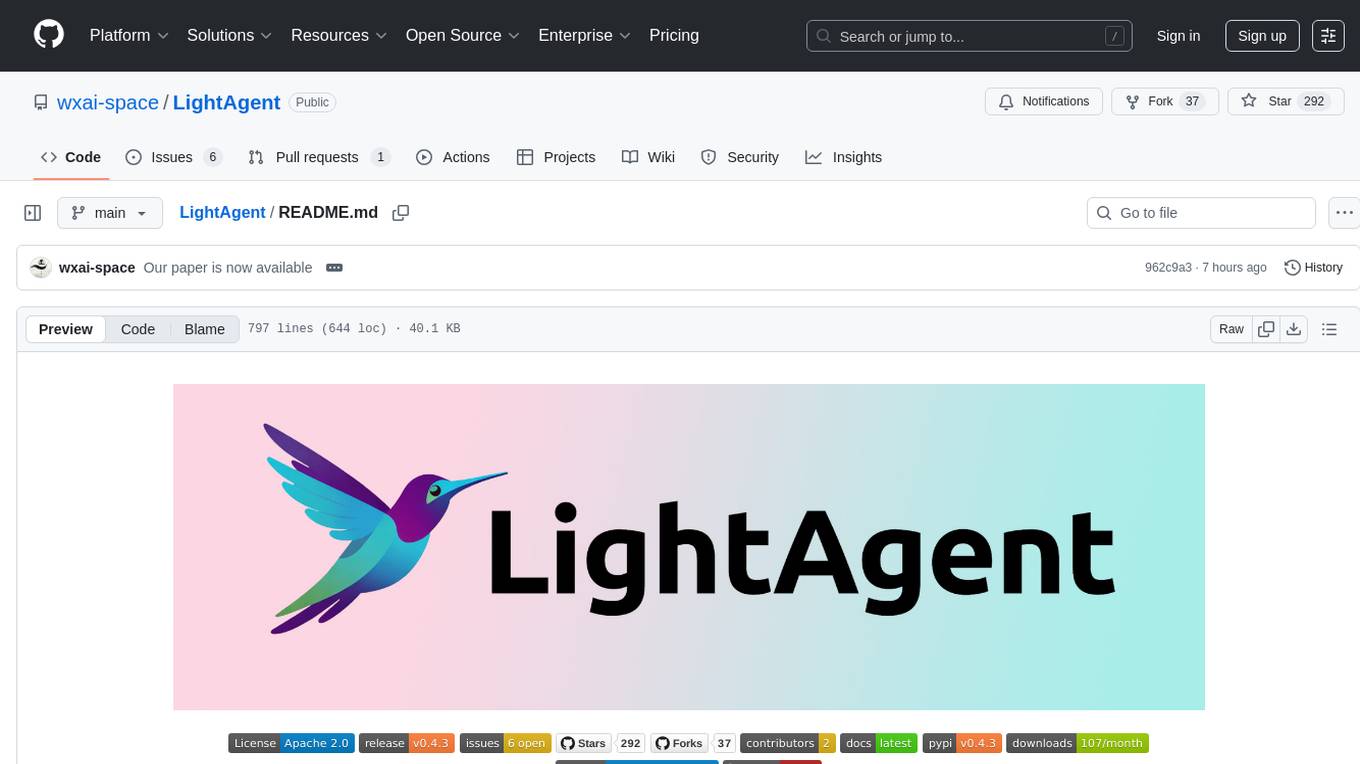
LightAgent
LightAgent is a lightweight, open-source Agentic AI development framework with memory, tools, and a tree of thought. It supports multi-agent collaboration, autonomous learning, tool integration, complex task handling, and multi-model support. It also features a streaming API, tool generator, agent self-learning, adaptive tool mechanism, and more. LightAgent is designed for intelligent customer service, data analysis, automated tools, and educational assistance.
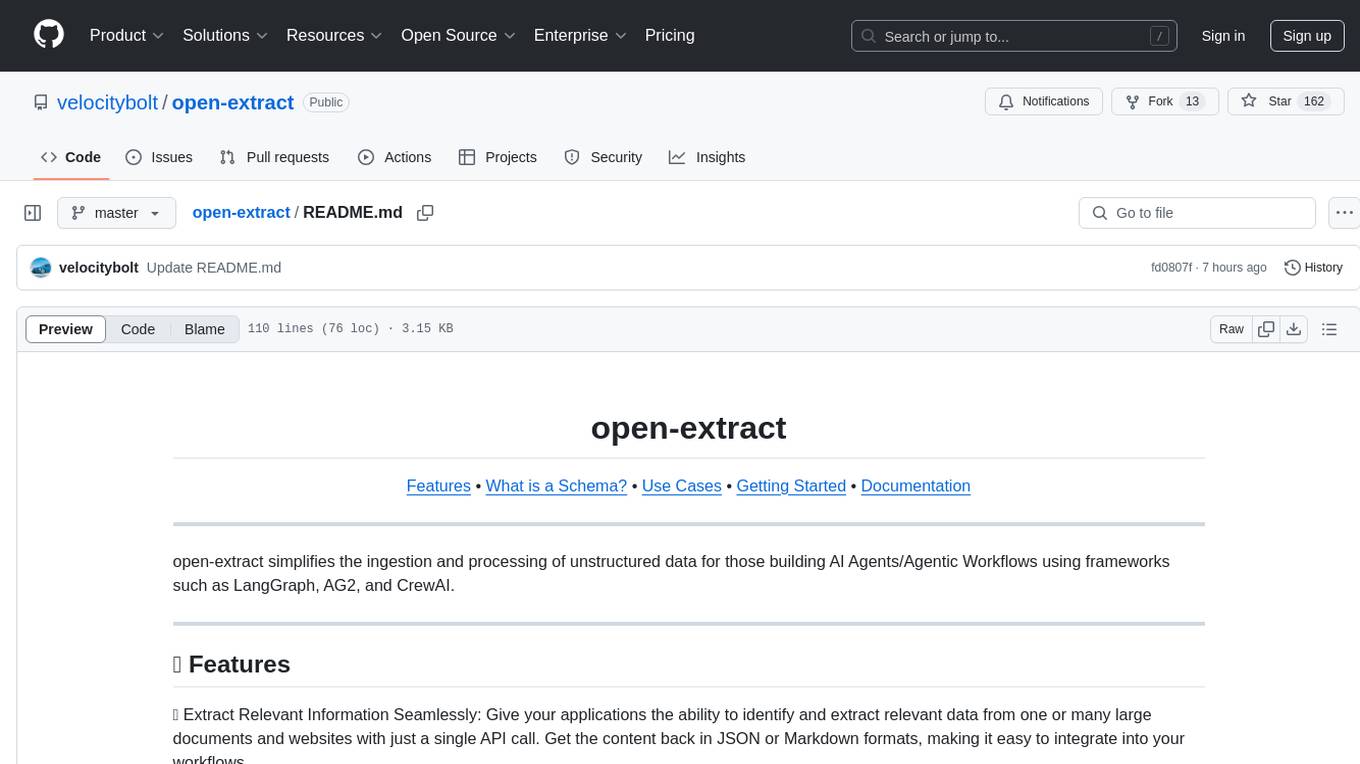
open-extract
open-extract simplifies the ingestion and processing of unstructured data for those building AI Agents/Agentic Workflows using frameworks such as LangGraph, AG2, and CrewAI. It allows applications to identify and extract relevant data from large documents and websites with a single API call, supporting multi-schema/multi-document extraction without vendor lock-in. The tool includes built-in caching for rapid repeat extractions, providing flexibility in model provider choice.
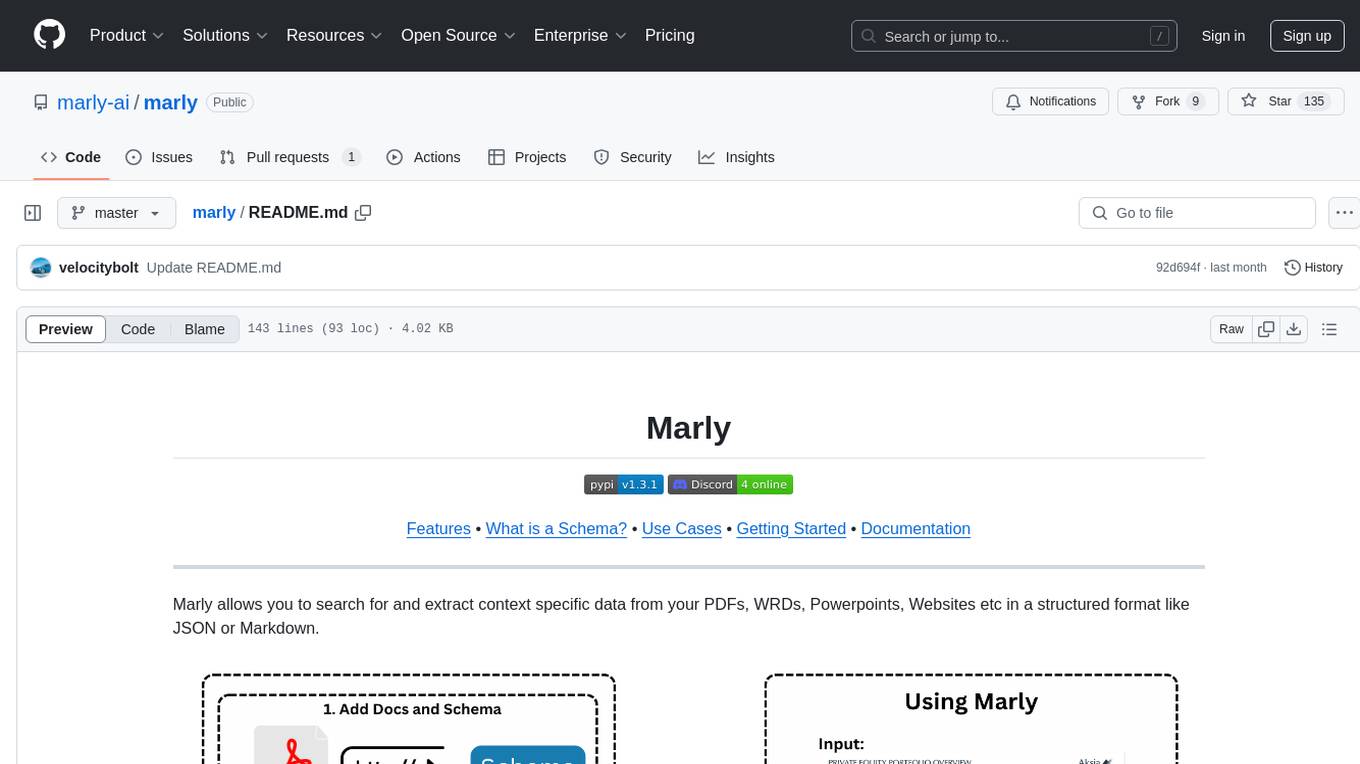
marly
Marly is a tool that allows users to search for and extract context-specific data from various types of documents such as PDFs, Word files, Powerpoints, and websites. It provides the ability to extract data in structured formats like JSON or Markdown, making it easy to integrate into workflows. Marly supports multi-schema and multi-document extraction, offers built-in caching for rapid repeat extractions, and ensures no vendor lock-in by allowing flexibility in choosing model providers.
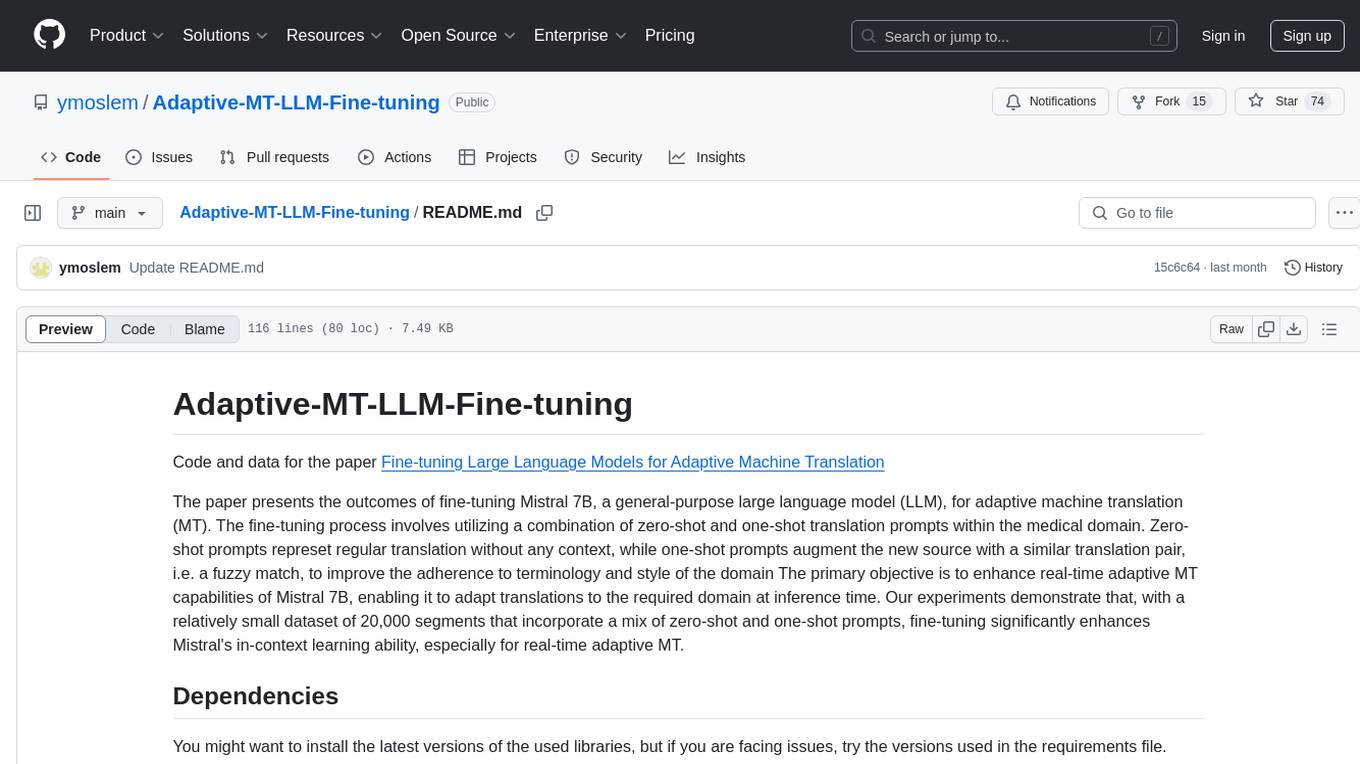
Adaptive-MT-LLM-Fine-tuning
The repository Adaptive-MT-LLM-Fine-tuning contains code and data for the paper 'Fine-tuning Large Language Models for Adaptive Machine Translation'. It focuses on enhancing Mistral 7B, a large language model, for real-time adaptive machine translation in the medical domain. The fine-tuning process involves using zero-shot and one-shot translation prompts to improve terminology and style adherence. The repository includes training and test data, data processing code, fuzzy match retrieval techniques, fine-tuning methods, conversion to CTranslate2 format, tokenizers, translation codes, and evaluation metrics.
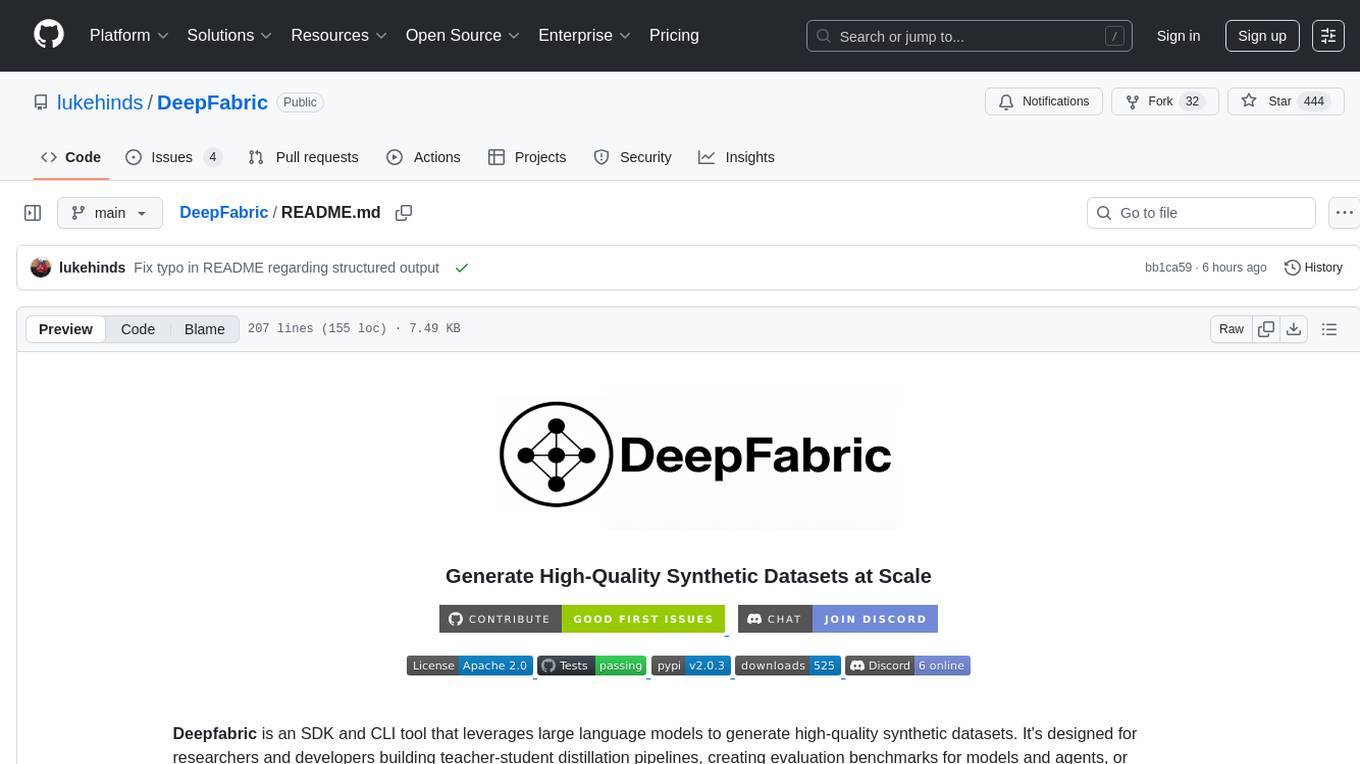
DeepFabric
Deepfabric is an SDK and CLI tool that leverages large language models to generate high-quality synthetic datasets. It's designed for researchers and developers building teacher-student distillation pipelines, creating evaluation benchmarks for models and agents, or conducting research requiring diverse training data. The key innovation lies in Deepfabric's graph and tree-based architecture, which uses structured topic nodes as generation seeds. This approach ensures the creation of datasets that are both highly diverse and domain-specific, while minimizing redundancy and duplication across generated samples.
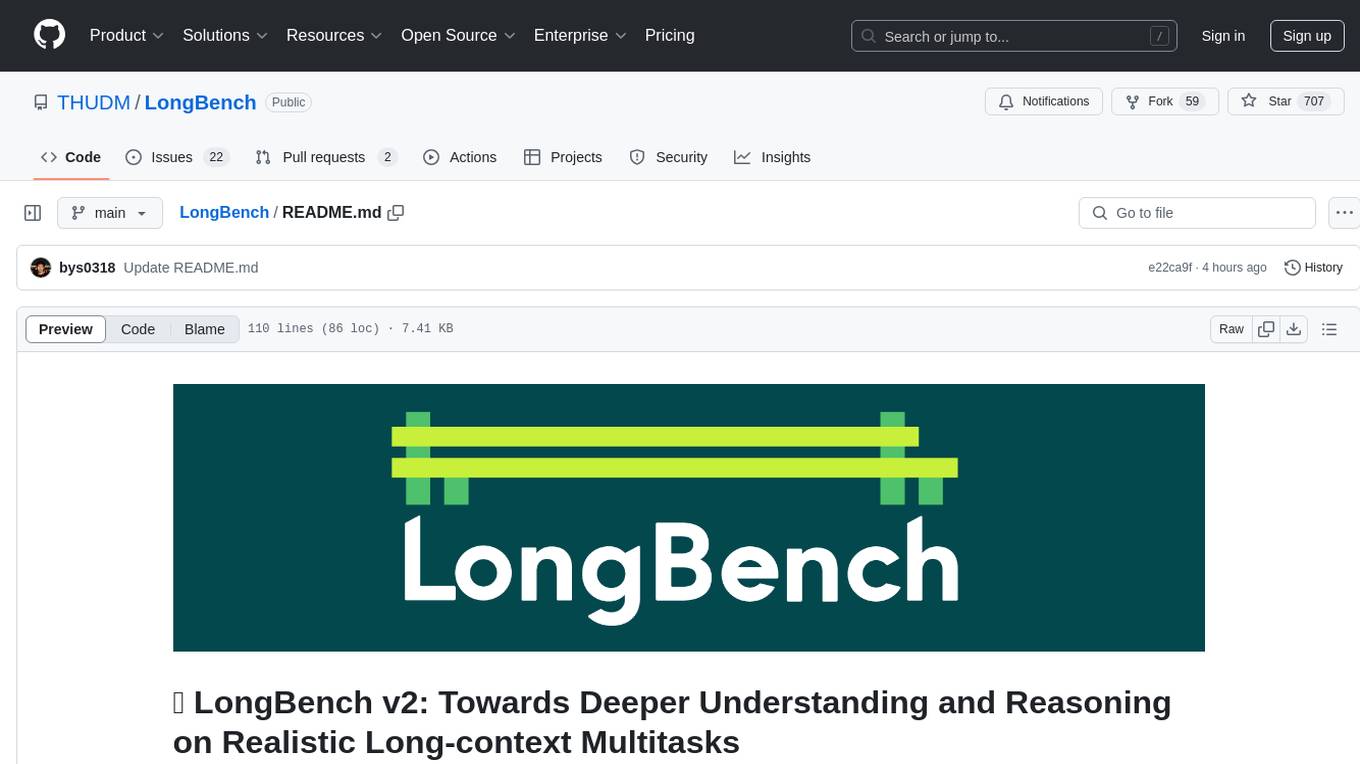
LongBench
LongBench v2 is a benchmark designed to assess the ability of large language models (LLMs) to handle long-context problems requiring deep understanding and reasoning across various real-world multitasks. It consists of 503 challenging multiple-choice questions with contexts ranging from 8k to 2M words, covering six major task categories. The dataset is collected from nearly 100 highly educated individuals with diverse professional backgrounds and is designed to be challenging even for human experts. The evaluation results highlight the importance of enhanced reasoning ability and scaling inference-time compute to tackle the long-context challenges in LongBench v2.
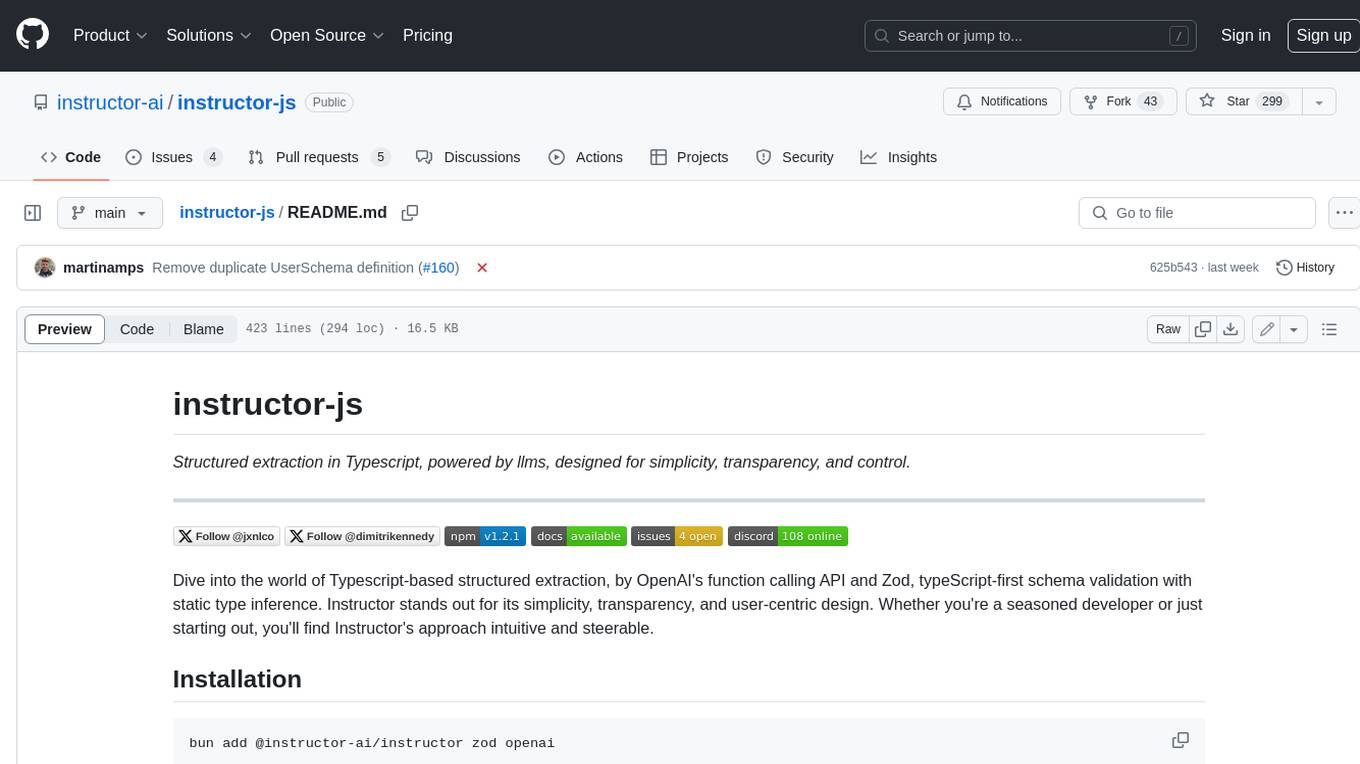
instructor-js
Instructor is a Typescript library for structured extraction in Typescript, powered by llms, designed for simplicity, transparency, and control. It stands out for its simplicity, transparency, and user-centric design. Whether you're a seasoned developer or just starting out, you'll find Instructor's approach intuitive and steerable.
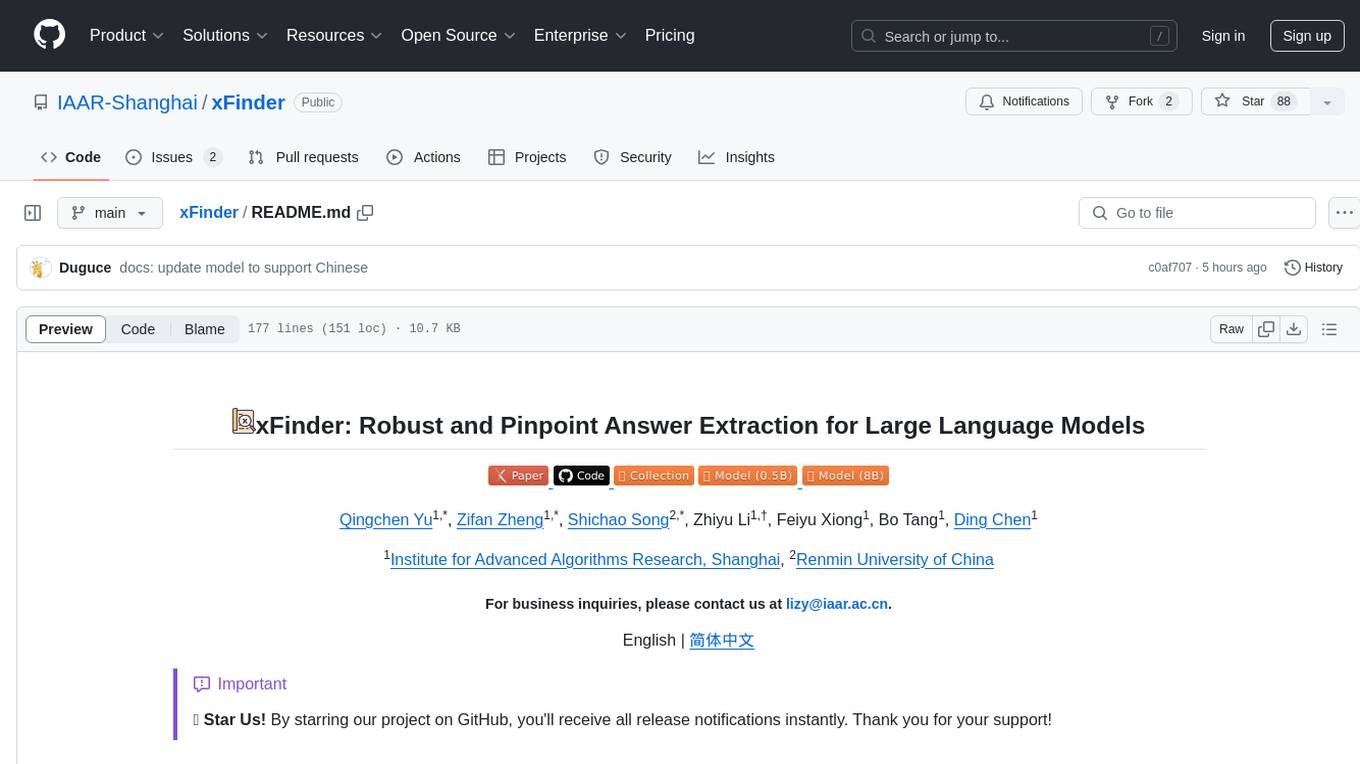
xFinder
xFinder is a model specifically designed for key answer extraction from large language models (LLMs). It addresses the challenges of unreliable evaluation methods by optimizing the key answer extraction module. The model achieves high accuracy and robustness compared to existing frameworks, enhancing the reliability of LLM evaluation. It includes a specialized dataset, the Key Answer Finder (KAF) dataset, for effective training and evaluation. xFinder is suitable for researchers and developers working with LLMs to improve answer extraction accuracy.
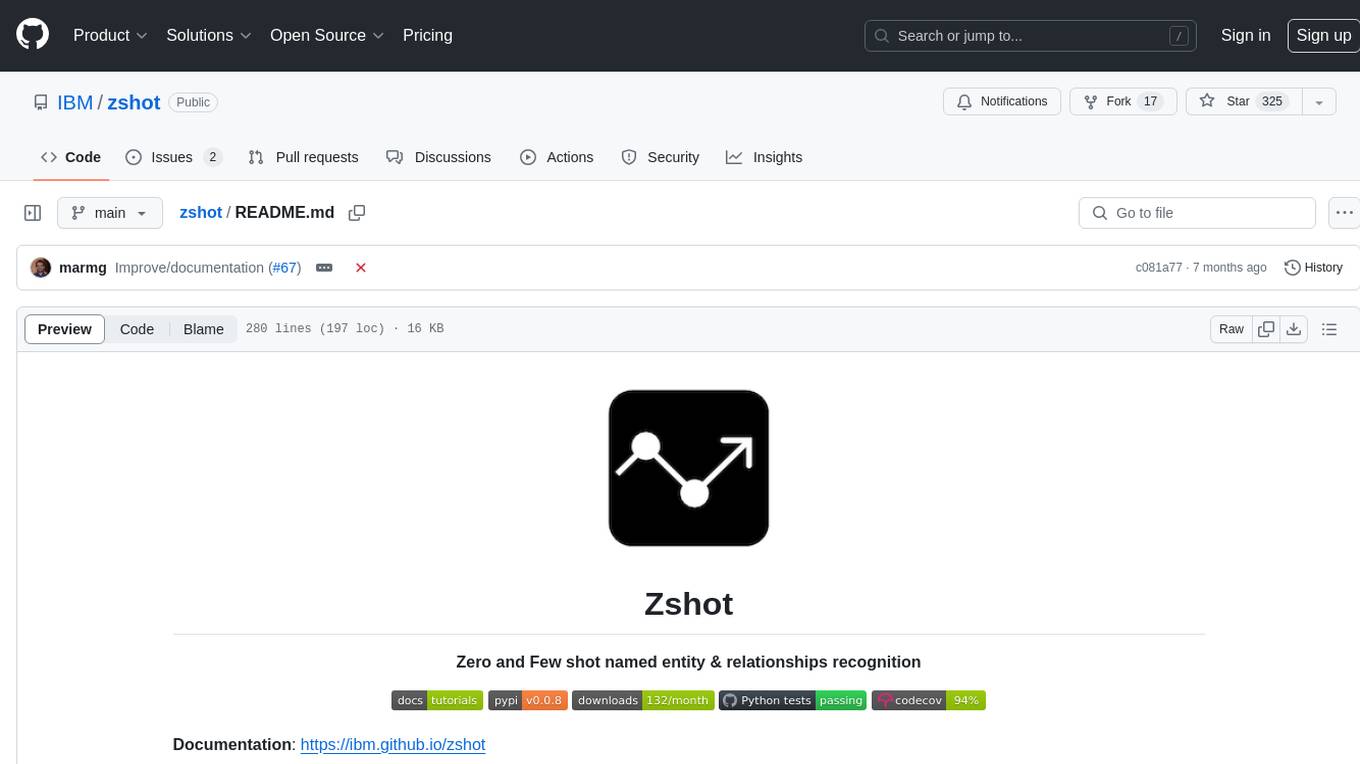
zshot
Zshot is a highly customizable framework for performing Zero and Few shot named entity and relationships recognition. It can be used for mentions extraction, wikification, zero and few shot named entity recognition, zero and few shot named relationship recognition, and visualization of zero-shot NER and RE extraction. The framework consists of two main components: the mentions extractor and the linker. There are multiple mentions extractors and linkers available, each serving a specific purpose. Zshot also includes a relations extractor and a knowledge extractor for extracting relations among entities and performing entity classification. The tool requires Python 3.6+ and dependencies like spacy, torch, transformers, evaluate, and datasets for evaluation over datasets like OntoNotes. Optional dependencies include flair and blink for additional functionalities. Zshot provides examples, tutorials, and evaluation methods to assess the performance of the components.
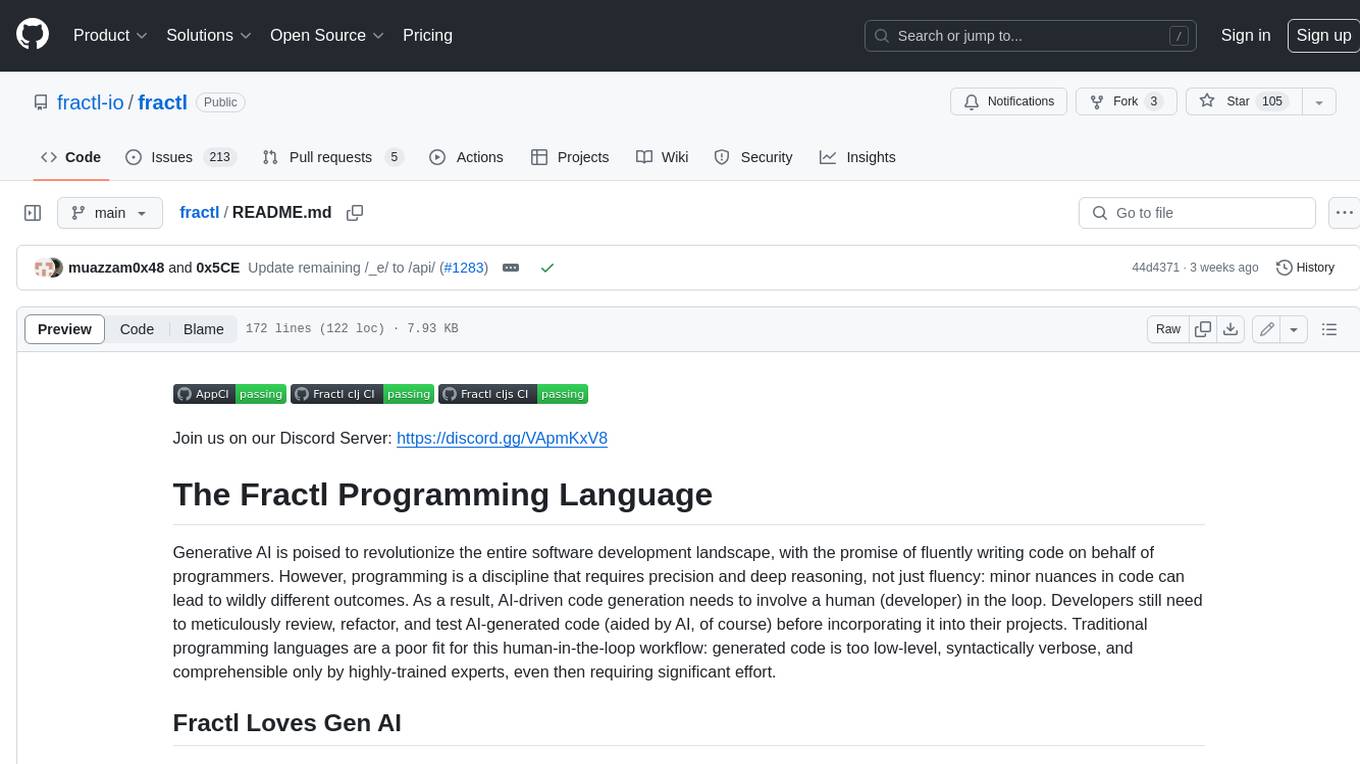
fractl
Fractl is a programming language designed for generative AI, making it easier for developers to work with AI-generated code. It features a data-oriented and declarative syntax, making it a better fit for generative AI-powered code generation. Fractl also bridges the gap between traditional programming and visual building, allowing developers to use multiple ways of building, including traditional coding, visual development, and code generation with generative AI. Key concepts in Fractl include a graph-based hierarchical data model, zero-trust programming, declarative dataflow, resolvers, interceptors, and entity-graph-database mapping.
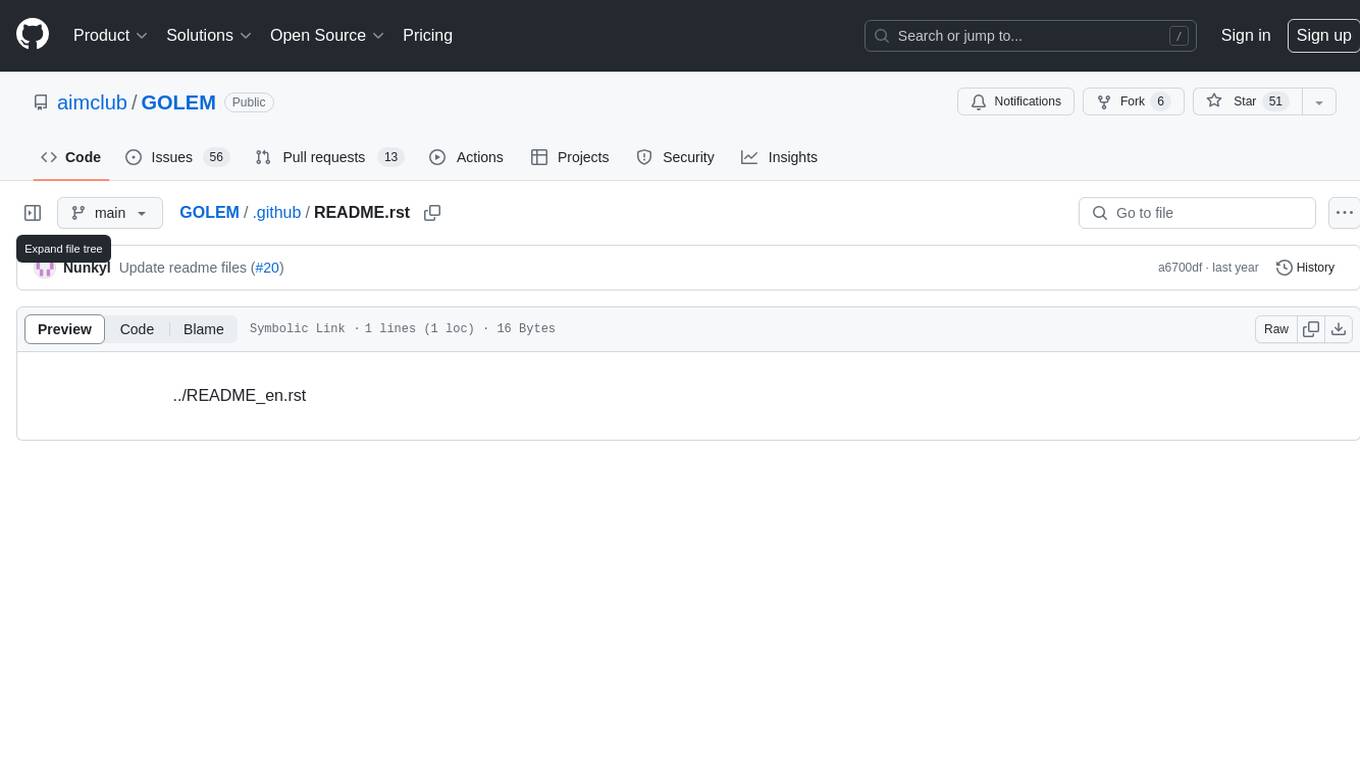
GOLEM
GOLEM is an open-source AI framework focused on optimization and learning of structured graph-based models using meta-heuristic methods. It emphasizes the potential of meta-heuristics in complex problem spaces where gradient-based methods are not suitable, and the importance of structured models in various problem domains. The framework offers features like structured model optimization, metaheuristic methods, multi-objective optimization, constrained optimization, extensibility, interpretability, and reproducibility. It can be applied to optimization problems represented as directed graphs with defined fitness functions. GOLEM has applications in areas like AutoML, Bayesian network structure search, differential equation discovery, geometric design, and neural architecture search. The project structure includes packages for core functionalities, adapters, graph representation, optimizers, genetic algorithms, utilities, serialization, visualization, examples, and testing. Contributions are welcome, and the project is supported by ITMO University's Research Center Strong Artificial Intelligence in Industry.
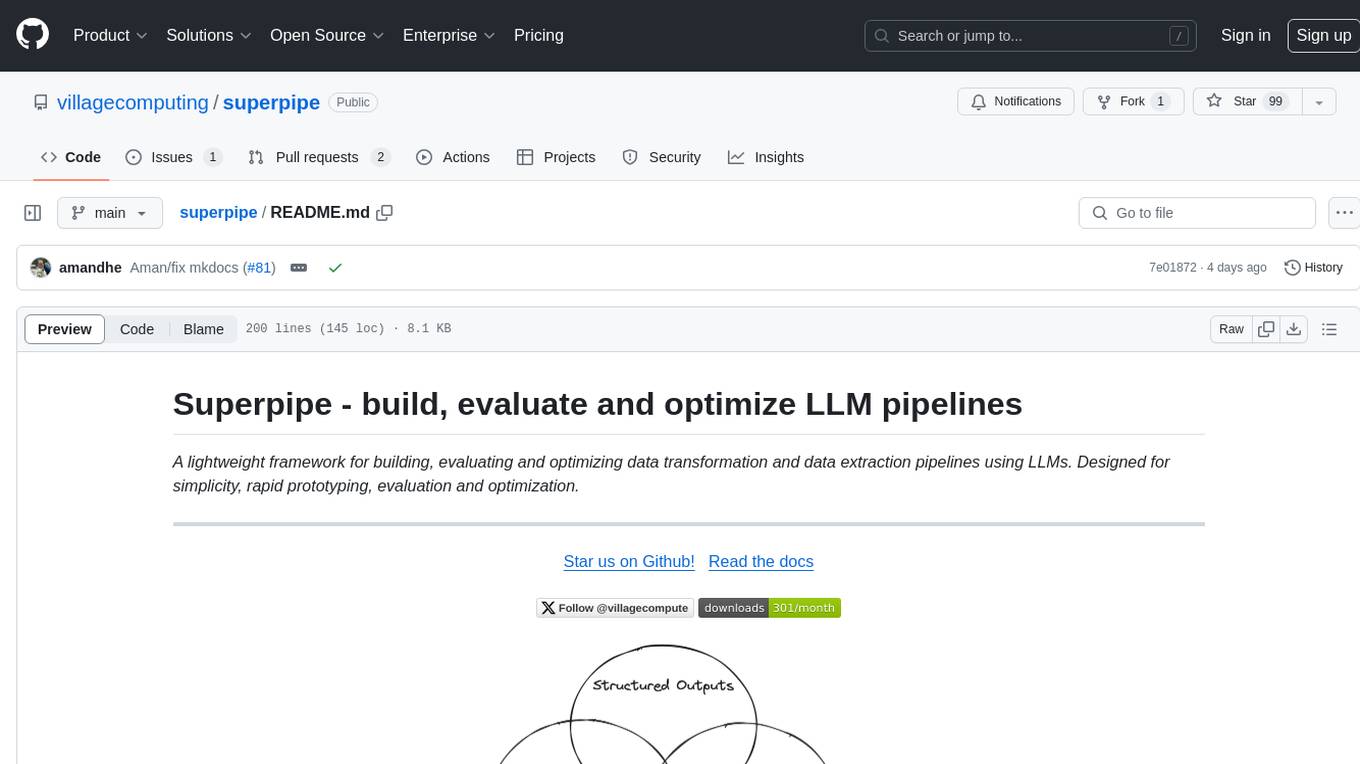
superpipe
Superpipe is a lightweight framework designed for building, evaluating, and optimizing data transformation and data extraction pipelines using LLMs. It allows users to easily combine their favorite LLM libraries with Superpipe's building blocks to create pipelines tailored to their unique data and use cases. The tool facilitates rapid prototyping, evaluation, and optimization of end-to-end pipelines for tasks such as classification and evaluation of job departments based on work history. Superpipe also provides functionalities for evaluating pipeline performance, optimizing parameters for cost, accuracy, and speed, and conducting grid searches to experiment with different models and prompts.
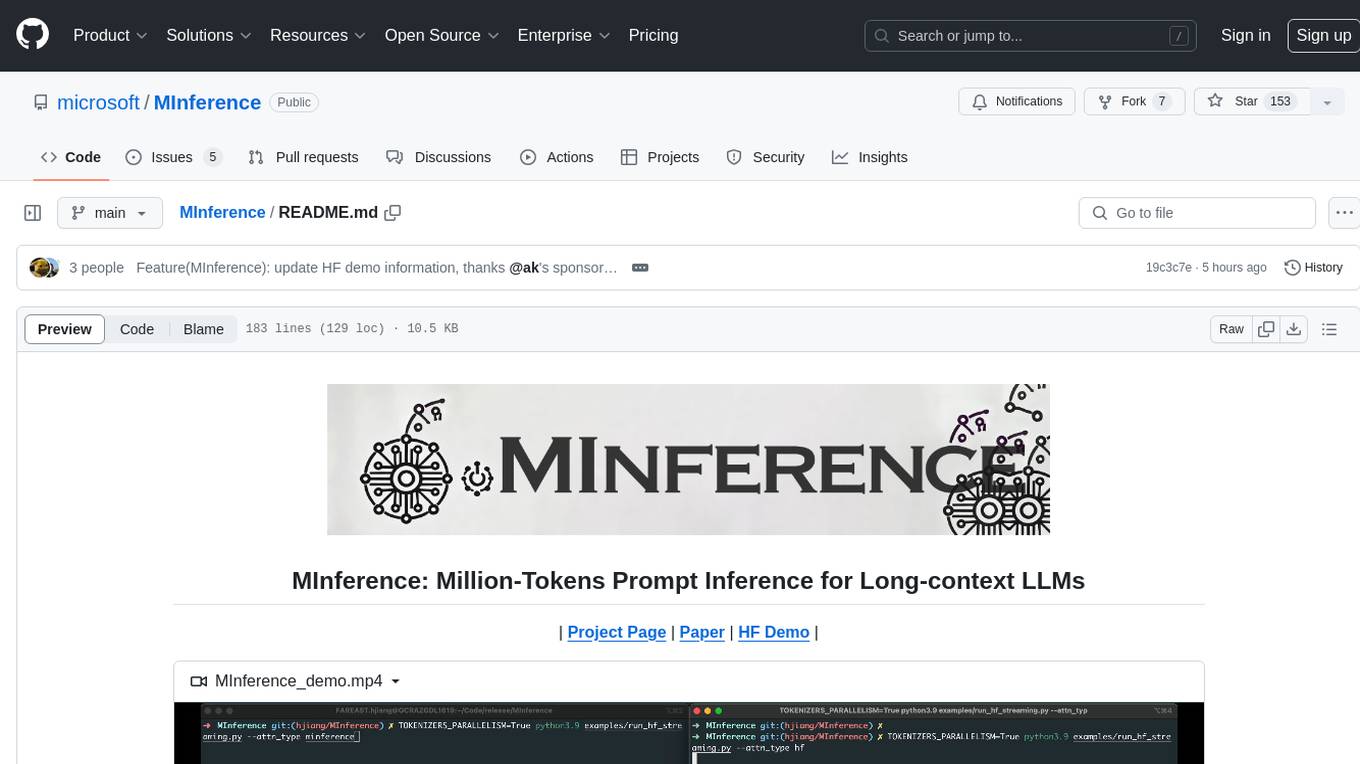
MInference
MInference is a tool designed to accelerate pre-filling for long-context Language Models (LLMs) by leveraging dynamic sparse attention. It achieves up to a 10x speedup for pre-filling on an A100 while maintaining accuracy. The tool supports various decoding LLMs, including LLaMA-style models and Phi models, and provides custom kernels for attention computation. MInference is useful for researchers and developers working with large-scale language models who aim to improve efficiency without compromising accuracy.
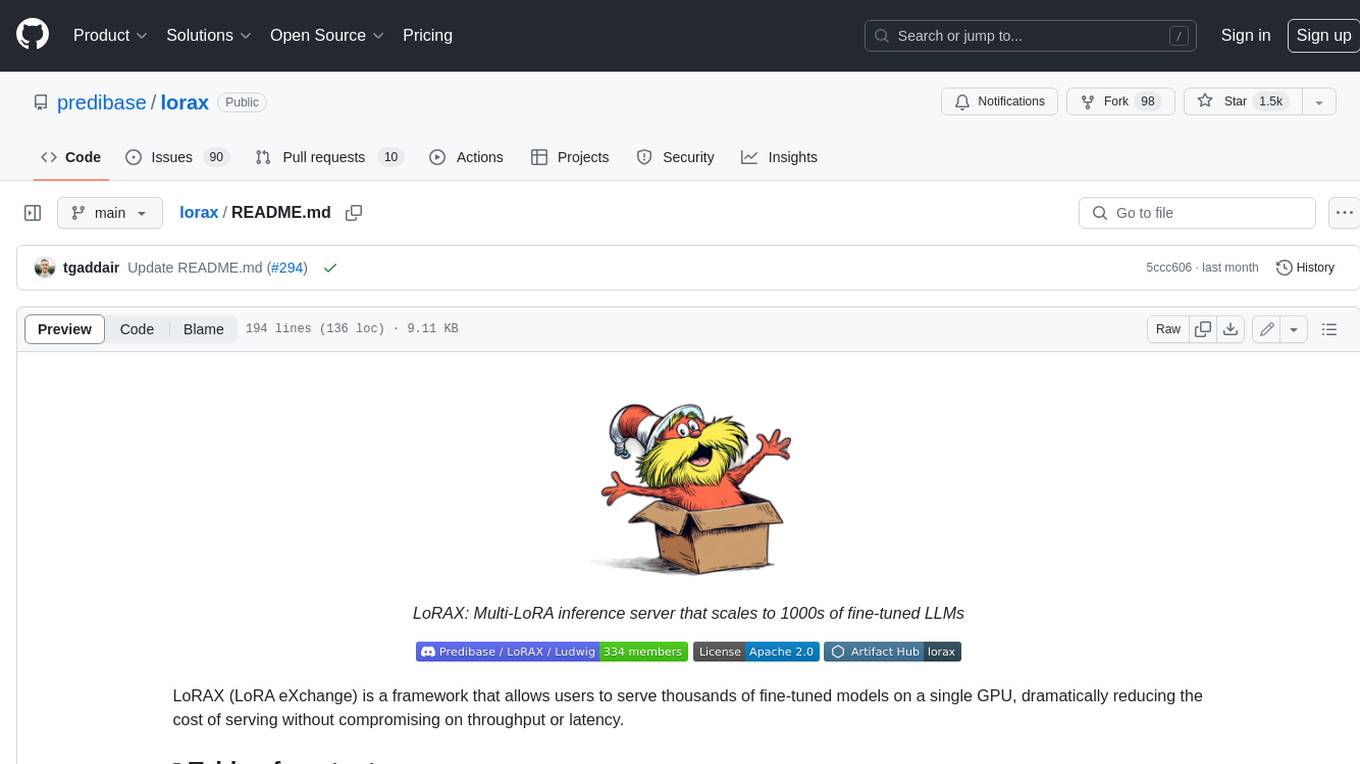
lorax
LoRAX is a framework that allows users to serve thousands of fine-tuned models on a single GPU, dramatically reducing the cost of serving without compromising on throughput or latency. It features dynamic adapter loading, heterogeneous continuous batching, adapter exchange scheduling, optimized inference, and is ready for production with prebuilt Docker images, Helm charts for Kubernetes, Prometheus metrics, and distributed tracing with Open Telemetry. LoRAX supports a number of Large Language Models as the base model including Llama, Mistral, and Qwen, and any of the linear layers in the model can be adapted via LoRA and loaded in LoRAX.
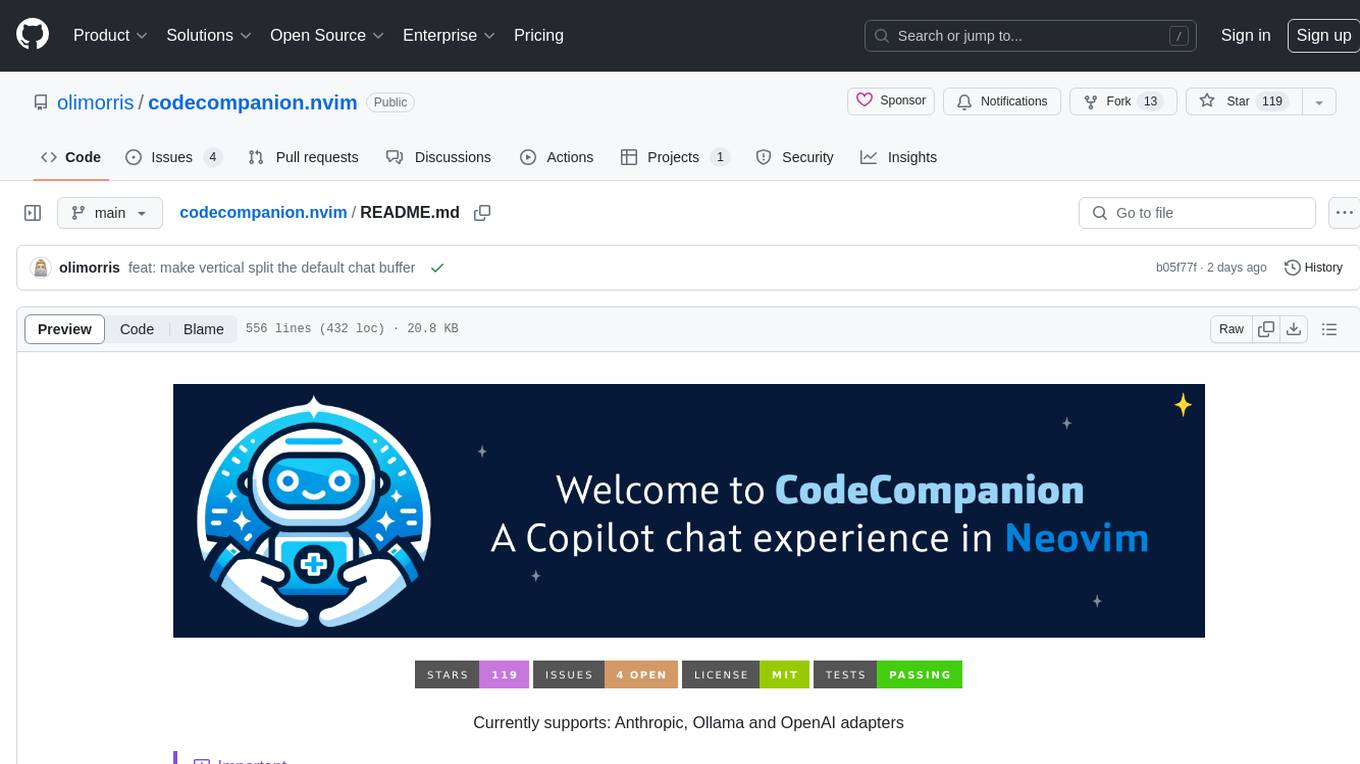
codecompanion.nvim
CodeCompanion.nvim is a Neovim plugin that provides a Copilot Chat experience, adapter support for various LLMs, agentic workflows, inline code creation and modification, built-in actions for language prompts and error fixes, custom actions creation, async execution, and more. It supports Anthropic, Ollama, and OpenAI adapters. The plugin is primarily developed for personal workflows with no guarantees of regular updates or support. Users can customize the plugin to their needs by forking the project.
For similar tasks

Azure-Analytics-and-AI-Engagement
The Azure-Analytics-and-AI-Engagement repository provides packaged Industry Scenario DREAM Demos with ARM templates (Containing a demo web application, Power BI reports, Synapse resources, AML Notebooks etc.) that can be deployed in a customer’s subscription using the CAPE tool within a matter of few hours. Partners can also deploy DREAM Demos in their own subscriptions using DPoC.

sorrentum
Sorrentum is an open-source project that aims to combine open-source development, startups, and brilliant students to build machine learning, AI, and Web3 / DeFi protocols geared towards finance and economics. The project provides opportunities for internships, research assistantships, and development grants, as well as the chance to work on cutting-edge problems, learn about startups, write academic papers, and get internships and full-time positions at companies working on Sorrentum applications.

tidb
TiDB is an open-source distributed SQL database that supports Hybrid Transactional and Analytical Processing (HTAP) workloads. It is MySQL compatible and features horizontal scalability, strong consistency, and high availability.

zep-python
Zep is an open-source platform for building and deploying large language model (LLM) applications. It provides a suite of tools and services that make it easy to integrate LLMs into your applications, including chat history memory, embedding, vector search, and data enrichment. Zep is designed to be scalable, reliable, and easy to use, making it a great choice for developers who want to build LLM-powered applications quickly and easily.

telemetry-airflow
This repository codifies the Airflow cluster that is deployed at workflow.telemetry.mozilla.org (behind SSO) and commonly referred to as "WTMO" or simply "Airflow". Some links relevant to users and developers of WTMO: * The `dags` directory in this repository contains some custom DAG definitions * Many of the DAGs registered with WTMO don't live in this repository, but are instead generated from ETL task definitions in bigquery-etl * The Data SRE team maintains a WTMO Developer Guide (behind SSO)

mojo
Mojo is a new programming language that bridges the gap between research and production by combining Python syntax and ecosystem with systems programming and metaprogramming features. Mojo is still young, but it is designed to become a superset of Python over time.

pandas-ai
PandasAI is a Python library that makes it easy to ask questions to your data in natural language. It helps you to explore, clean, and analyze your data using generative AI.

databend
Databend is an open-source cloud data warehouse that serves as a cost-effective alternative to Snowflake. With its focus on fast query execution and data ingestion, it's designed for complex analysis of the world's largest datasets.
For similar jobs

sweep
Sweep is an AI junior developer that turns bugs and feature requests into code changes. It automatically handles developer experience improvements like adding type hints and improving test coverage.

teams-ai
The Teams AI Library is a software development kit (SDK) that helps developers create bots that can interact with Teams and Microsoft 365 applications. It is built on top of the Bot Framework SDK and simplifies the process of developing bots that interact with Teams' artificial intelligence capabilities. The SDK is available for JavaScript/TypeScript, .NET, and Python.

ai-guide
This guide is dedicated to Large Language Models (LLMs) that you can run on your home computer. It assumes your PC is a lower-end, non-gaming setup.

classifai
Supercharge WordPress Content Workflows and Engagement with Artificial Intelligence. Tap into leading cloud-based services like OpenAI, Microsoft Azure AI, Google Gemini and IBM Watson to augment your WordPress-powered websites. Publish content faster while improving SEO performance and increasing audience engagement. ClassifAI integrates Artificial Intelligence and Machine Learning technologies to lighten your workload and eliminate tedious tasks, giving you more time to create original content that matters.

chatbot-ui
Chatbot UI is an open-source AI chat app that allows users to create and deploy their own AI chatbots. It is easy to use and can be customized to fit any need. Chatbot UI is perfect for businesses, developers, and anyone who wants to create a chatbot.

BricksLLM
BricksLLM is a cloud native AI gateway written in Go. Currently, it provides native support for OpenAI, Anthropic, Azure OpenAI and vLLM. BricksLLM aims to provide enterprise level infrastructure that can power any LLM production use cases. Here are some use cases for BricksLLM: * Set LLM usage limits for users on different pricing tiers * Track LLM usage on a per user and per organization basis * Block or redact requests containing PIIs * Improve LLM reliability with failovers, retries and caching * Distribute API keys with rate limits and cost limits for internal development/production use cases * Distribute API keys with rate limits and cost limits for students

uAgents
uAgents is a Python library developed by Fetch.ai that allows for the creation of autonomous AI agents. These agents can perform various tasks on a schedule or take action on various events. uAgents are easy to create and manage, and they are connected to a fast-growing network of other uAgents. They are also secure, with cryptographically secured messages and wallets.

griptape
Griptape is a modular Python framework for building AI-powered applications that securely connect to your enterprise data and APIs. It offers developers the ability to maintain control and flexibility at every step. Griptape's core components include Structures (Agents, Pipelines, and Workflows), Tasks, Tools, Memory (Conversation Memory, Task Memory, and Meta Memory), Drivers (Prompt and Embedding Drivers, Vector Store Drivers, Image Generation Drivers, Image Query Drivers, SQL Drivers, Web Scraper Drivers, and Conversation Memory Drivers), Engines (Query Engines, Extraction Engines, Summary Engines, Image Generation Engines, and Image Query Engines), and additional components (Rulesets, Loaders, Artifacts, Chunkers, and Tokenizers). Griptape enables developers to create AI-powered applications with ease and efficiency.



